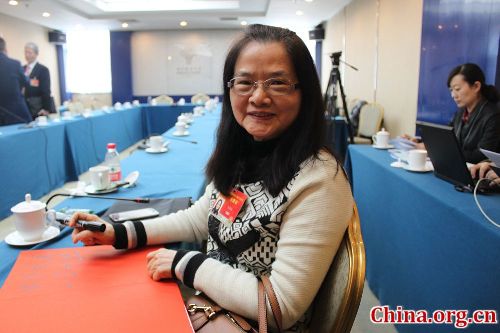HK entrepreneur expects more mainland and HK cooperation

Christina Cheung, executive director and chairman of Hong Kong-based South China Holdings and a member of the National Committee of the Chinese People's Political Consultative Conference, talks with China.org.cn on March 11, 2015. [China.org.cn]
A Hong Kong entrepreneur attending the annual session of China's top advisory body in Beijing on Wednesday said she expects to see more financial cooperation between the mainland and Hong Kong.
Choi Ngor Cheung, also known as Christina Cheung, is executive director and chairman of Hong Kong-based South China Holdings and a member of the National Committee of the Chinese People's Political Consultative Conference.
"I hope the Chinese central government will include Hong Kong in the nation's 13th Five-Year Plan," Cheung said, "then the plan can attract many Hong Kong professionals to the mainland to become career role models and personalities who can inspire all of society to be good and honest and maintain social morality."
Cheung said she hates to see many mainland residents put economic profits ahead of spiritual and moral excellence. "Hong Kong role models can also inspire the resolution of several conflicts between mainland and Hong Kong," she asserted.
She pointed out that Hong Kong's financial and shipping sectors are highly developed, explaining, "The mainland and Hong Kong can cooperate in those sectors, especially the finance sector. Such cooperation will give birth to many new financial products."
"China's 'Belt and Road' initiatives are great and will help other countries along the road build the infrastructure," Cheung continued. The "Belt and Road" refers to the Silk Road Economic Belt and the 21st Century Maritime Silk Road initiatives proposed by China in 2013 to improve cooperation with countries in vast sections of Asia, Europe and Africa. "For one thing, we can export our technologies. For another, we will be able to calculate the costs of raw materials and the terms of service contracts in RMB, which will help RMB become more internationalized."
Cheung advised that when participating in the "Belt and Road" infrastructure construction, China should also consider other neighboring countries' feelings and communicate with them more frequently to eliminate doubts and misunderstandings. She stated that the same is also true for cooperation between the mainland and Hong Kong in areas like the newly planned Guangdong Free Trade Zone.
"The rules of game for the Guangdong Free Trade Zone must be clearly written," Cheung said. "Guangdong and Hong Kong can support and complement each other. The key is to not make either side feel like its counterpart is a threat, but instead make them feel like they are collaborating brothers. Guangdong can learn from Hong Kong's experience in finance, and Hong Kong can explore the manufacturing industry in Guangdong Province. When they work together, they will eventually reach a win-win outcome."
